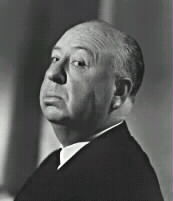
Alfred Hitchcock 
Hitchcock was born August 13, 1899, the third and youngest son of Emma and William, a London poultry dealer and fruit importer. Hitchcock grew up with his older siblings, William and Ellen Kathleen in Leytonstone, part of London's East End. Fascinated by numbers and technology, Alfred was educated at the Jesuits' St. Ignatius College, but left school at 16 to study engineering and navigation at the University of London. ![]() Three years later, he started work as an estimator at Henley Telegraph Company
Three years later, he started work as an estimator at Henley Telegraph Company
Hitchcock's films may also have been colored by his Catholic upbringing, at a time when Catholics in England weren't popular. Getting established In any case, Hitchcock entered the film industry in 1920 as a designer of titles for the newly formed London branch of Hollywood's Famous Players-Lasky (Paramount). Before long he was head of the title department. He'd begun to work in assistant direction, art direction and screenwriting
In1925, he was promoted to director, and his film career began. While he worked on an Anglo-German production, "The Pleasure Garden,", in that year he appeared as an extra in a film and later Cameo roles would become a Hitchcock trademark -- and spotting them would become a sideline passion among fans.
A year after he gained the title of director, Hitchcock married film editor Alma Reville; she'd become his screenwriting collaborator Over the course of the next 50 years, Hitchcock spun a remarkably consistent thread of suspenseful stories, which earned him six Oscar nominations for best director. He never won. He drew top actors -- from Cary Grant and Doris Day to Grace Kelly, Marlene Dietrich and James Stewart. And he was a top box-office draw, himself, from his first Oscar nod, 1940's "Rebecca," through 1966's Cold War drama, "Torn Curtain."
1955.was an auspicious year for Alfred Hitchcock-- he became a U.S. citizen and launched Alfred Hitchcock Presents, the TV show that catapulted him from lauded director and celebrity to icon. His visibility was increased by the uproar over his film Psycho. Not until 1968 did the Academy of Motion Picture Arts and Sciences finally give Hitchcock a statuette, honoring him with the Irving G. Thalberg Memorial Award for lifetime achievement. In 1979, the American Film Institute also gave him a lifetime achievement award.
But along the way, awards or no, directors have taken notice of Hitchcock's use of suspense; plot twists and dramatic camera shots. On the individual level, Martin Scorsese is just one director who's paid tribute to Hitchcock: He once wrote of "Vertigo" that it "is ... important to me -- 'essential' would be more like it -- because it has a hero driven purely by obsession. I've always been attracted in my own work to heroes motivated by obsession, and on that level, 'Vertigo' strikes a deep chord in me every time I see it."
Hitchcock wrote, produced and directed films up until 1979. His best-known later works include The Birds, Marnie, and Family Plot. Despite his
penchant for murder, mayhem and shock, Alfred Hitchcock and his family led a quiet and unostentatious life, preferring the comforts of home to the Hollywood milieu around them. In the last year of his life, Hitchcock received the American Film Institute's lifetime achievement award and was knighted in England. He died in 1980 in Los Angeles.
Hitchcock's legacy is vast: books, tributes, film festivals, and imitators abound.
Alfred Hitchcock Mystery Magazine, the monthly publication that bears his name, and other "Alfred Hitchcock Presents" anthologies, are still going strong.